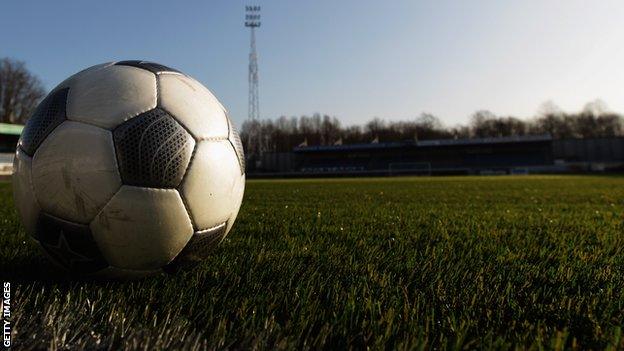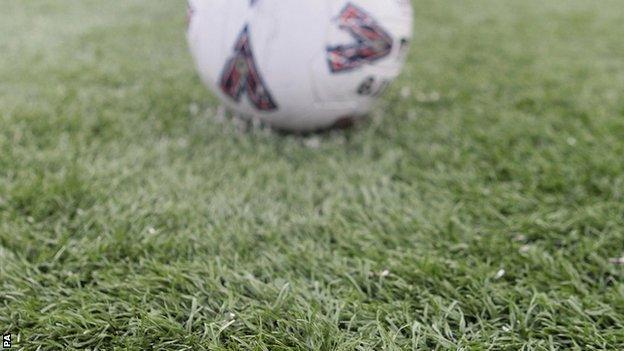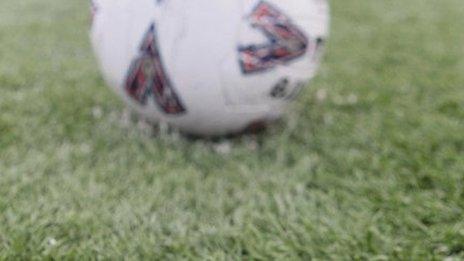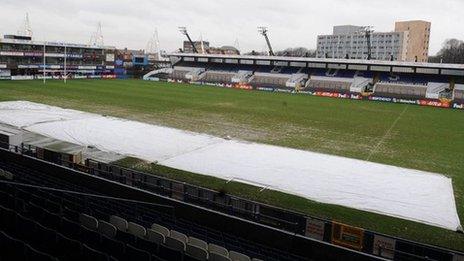Artificial pitches set to return to Football League
- Published

Artificial surfaces are permitted throughout Europe
The return of artificial pitches to the Football League has been backed by club chairmen in League One and Two.
At a meeting on Thursday they gave a strong indication they would vote in favour of permitting 3G ("third generation") surfaces from next season.
They will take a formal vote in November.
Artificial surfaces were banned from English professional football in 1995 over issues with ball roll and bounce and fears over long-term injuries.
3G or not 3G? | |
|---|---|
3G pitches consist of artificial blades supported by sand and rubber crumb | They can be laid on various shock absorbing bases to suit different sports |
3G pitches cost around £500,000 to install | They can be used in all weather |
The proposal was previously aired at a summer meeting in Portugal where a show of hands indicated support.
At the latest meeting, in Walsall, chairmen viewed a presentation at which costs of installing a Fifa two-star-rated 3G surface were examined, along with a variety of other factors including injury rates and competition balance.
Again, they were asked to vote and 29 out of 46 members said they would back the re-introduction.
Rules are now expected to be drawn up and a formal vote on whether to allow them from the start of next season will be taken at the next meeting in November.
Artificial surfaces were allowed in the FA Cup earlier this year.
Plastic pitches | |
|---|---|
Loftus Road, home of QPR, was the first English ground to lay a plastic pitch in 1981. It stayed until 1988 | Preston North End were the last of four clubs to try the experiment, putting theirs down in 1986 before ripping it up in 1994 |
Non-league Hyde lasted until 1995 before replacing theirs | Oldham Athletic won promotion to the top flight while using a plastic pitch in 1991 |
The vote is also expected to allow the plastic pitches to be used in the Capital One Cup and Johnstone's Paint Trophy.
Plastic pitches were banned from English professional football after four clubs - QPR, Luton Town, Oldham Athletic and Preston North End - tried them during the 1980s.
In July, Conference clubs voted to allow 3G pitches into all three divisions from the 2015/16 season.
English Premiership rugby union sides Saracens and Newcastle and Pro-12 side Cardiff Blues have all installed artificial surfaces, while Super League's Widnes Vikings use one at the Select Security Stadium.
AFC Wimbledon chief executive Erik Samuelson, who was at the meeting, suggested the fan-owned club may look into installing a 3G surface at their Kingsmeadow Stadium.
"I will be taking the findings from the presentation back to the board and we will have a meeting next week with the manager where we will go through the pros and cons," he told BBC Sport.

Gary Bannister scores for QPR during the early eighties when the west London club used an artificial surface
"For any community club it's a massive plus because it can involve the community. I went to the Allianz Arena and saw fathers and their kids come onto the pitch with a rugby ball - that's a community club. From the community view I am in favour but there are other footballing factors to consider before we decide."
Rochdale chairman Chris Dunphy said it was unlikely such a surface would be installed at the League One club's Spotland home.
"I know [manager] Keith Hill is not keen," he explained. "And they would not be permitted in the Championship so if you got promoted you would have to pull it up. It's worthy of consideration but not something I am widely enthusiastic about."
- Published24 March 2014

- Published31 July 2014

- Published13 June 2013

- Published7 June 2019
